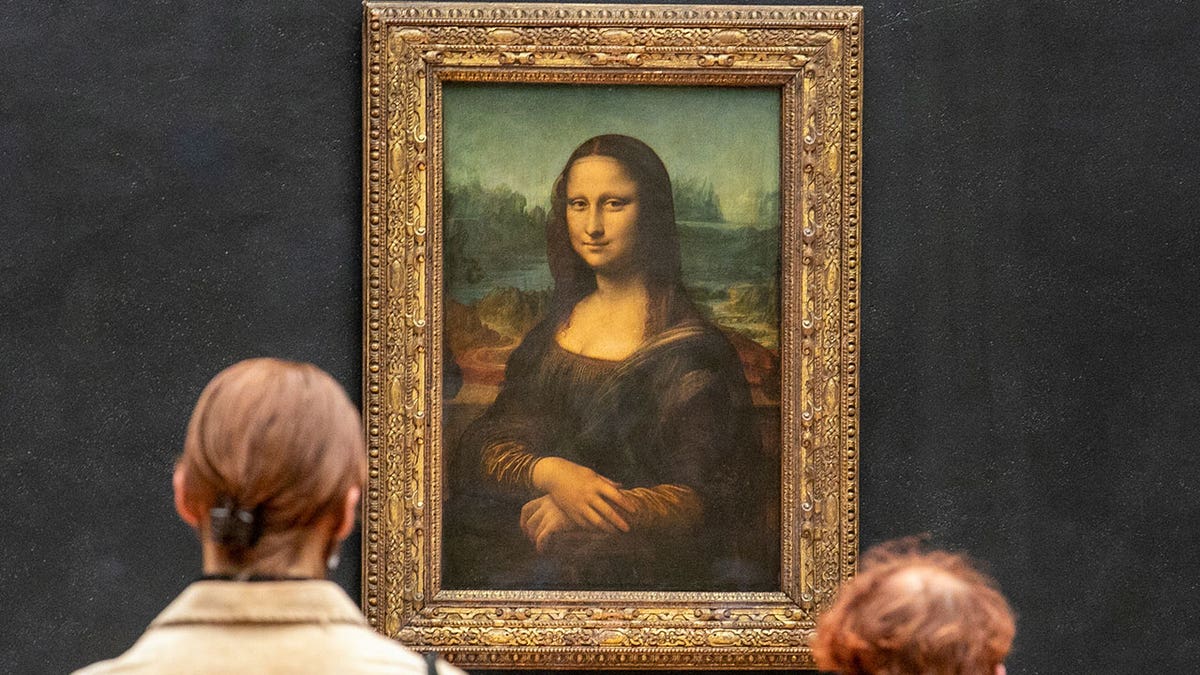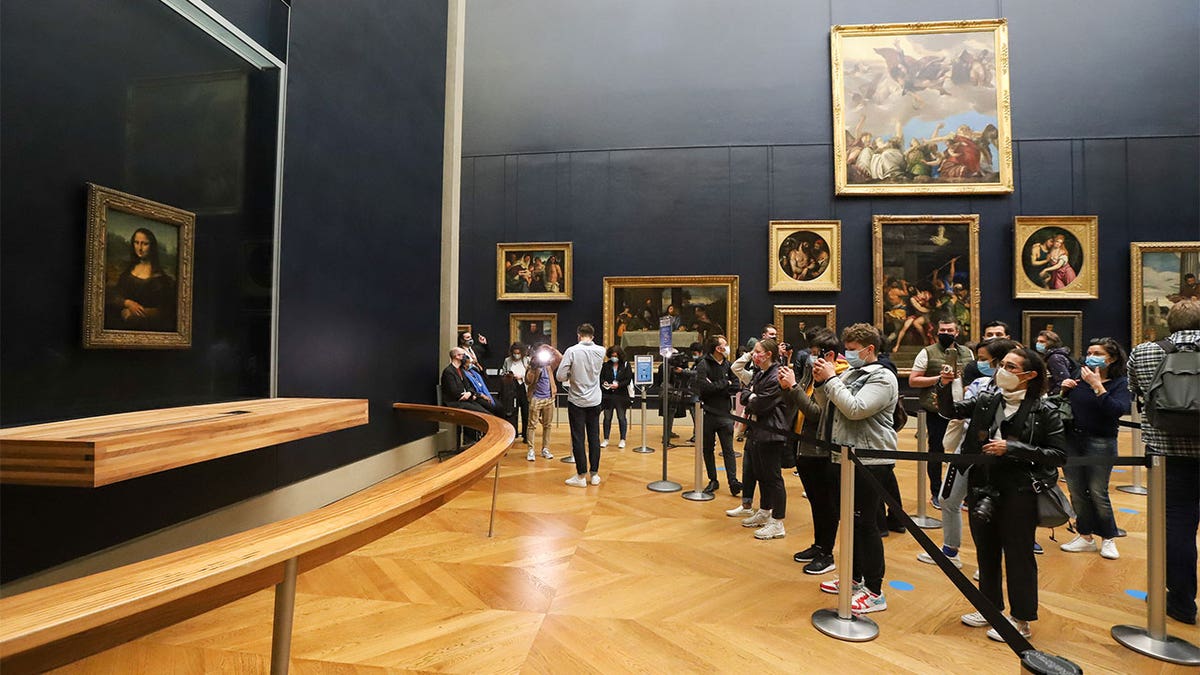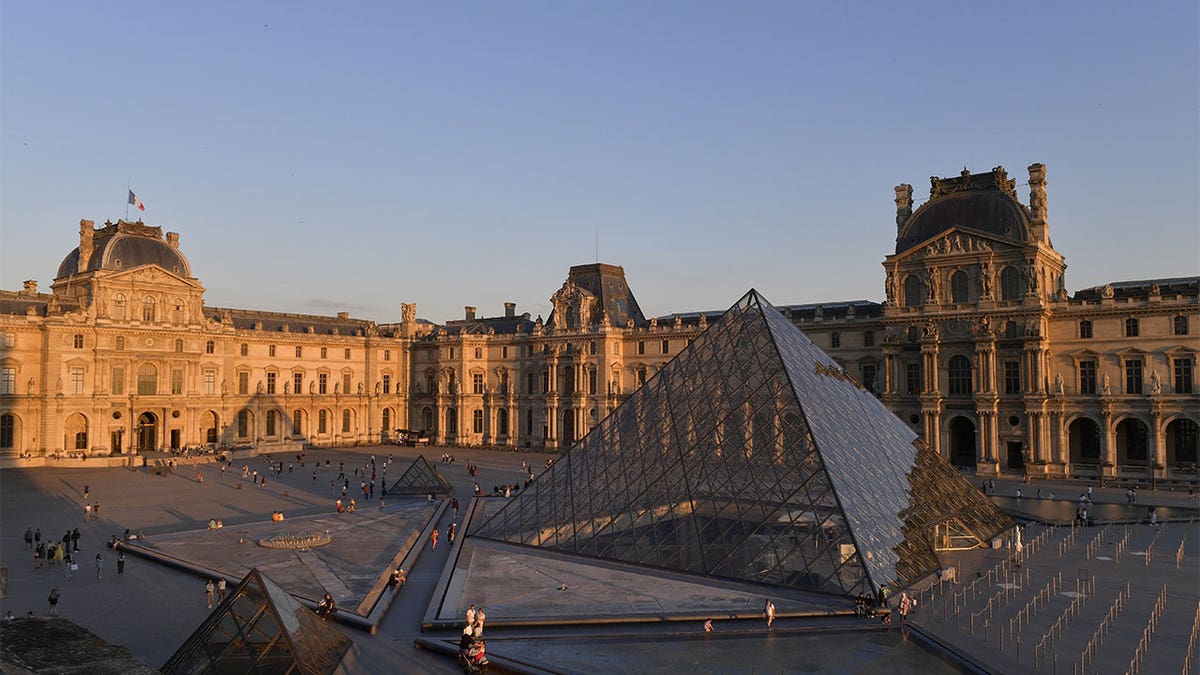The Mona Lisa is smeared in cream by protester
A man disguised in a ladies' wig jumped up from a wheelchair to throw cake at the Mona Lisa in the Louvre Museum in Paris on Sunday in what was apparently meant as a climate protest. (@Luke_sundberg_ / Body Cams+ / TMX)
Many historians have come up with answers about whom they believed the Mona Lisa was in real life. The most common answer is that the Mona Lisa is a portrait of the real-life Lisa Gherardini who was born on June 15, 1479, in Via Maggio, Republic of Florence and died July 15, 1542. Gherardini was the wife of a Florentine merchant named Francesco del Giocondo. Some historians though have different thoughts about who the famous artwork represents. Some believe that the Mona Lisa isn't a real person at all, rather a figment of Leonardo da Vinci's imagination or a portrait representing many women. Others believe that it is a self-portrait of Leonardo da Vinci himself. Even though there are theories about who the the person in the painting with the famous subtle smile is, Lisa Gherardini leads the way as the most-popular theory. The artwork, which has become one of the most famous paintings in the world can be found at Louvre Museum in Paris and has been there since 1804.
Why does the Mona Lisa have no eyebrows?
The Mona Lisa actually does (or did) have eyebrows that are no longer visible in the painting. According to a Parisian engineer named Pascal Cotte, who did a deep study of the painting, said that the woman in the painting at one point had both eyelashes and eyebrows but over time, they have become no longer visible. Cotte said that 240 megapixel scans performed on the painting show traces of what used to be her left eyebrow.

Millions of people visit the Louvre Museum in Paris, France every year. The Mona Lisa, pictured here, is one of many famous paintings housed in the Louvre. (Marc Piasecki/Getty Images)
What is hidden in the Mona Lisa?
The same engineer who discovered the eyebrows of the Mona Lisa also discovered an interesting finding underneath the popular painting. Cotte created a Lumiere technology camera that was able to identify charcoal lines in areas of the painting. The Louvre Museum allowed Cotte to take photographic scans of the Mona Lisa and he published his findings in the Journal of Cultural Heritage in August 2020. His camera used the layer amplification method (LAM) to detect light that was reflected on 13 wavelengths. In simpler terms, this method allowed him to see tiny details hidden beneath the painting that were not visible to the naked eye.
Cotte discovered that Leonardo da Vinci used the "splovero" technique when creating the painting which means transferring early sketches of the paining onto a canvas by making holes along the outside of the sketch. He found that the under drawing of the painting shows a different silhouette then what is showcased in the painting. Lastly, he discovered a small hairpin placed just above the Mona Lisa's head, which he found particularly interesting because at the time, it wasn't a typical hairstyle for woman in Florence, which he believes alludes to the idea that the painting wasn't a portrait as many believe, but rather a painting of an "unreal woman, like a goddess."
How many times was the Mona Lisa Vandalized?
The Mona Lisa has been vandalized five times with the first known-time dating all the way back to 1956 and the most recent being in 2022.

Millions make their way to the Louvre every year to catch a glimpse of the famous painting. ((Photo by Marc Piasecki/Getty Images)
In 1956, the Mona Lisa was attacked not once, but twice. First, someone threw acid at it and hit the lower portions of the painting. That same year, a rock was thrown at the Mona Lisa. Luckily, the painting had been put behind glass.
MONA LISA'S SMILE WAS NOT GENUINE WHEN LEONARDO DA VINCI PAINTED HER, SCIENTISTS SAY
In 1974, the Mona Lisa hit the road. While at the Tokyo National Museum, a woman sprayed the top of Mona Lisa with red paint.
In 2009, the Mona Lisa painting was hit again, this time not by a rock, but by a teacup and in 2022, the Mona Lisa got caked in protest of climate change. A 36-year-old man, who was dressed as a woman in a wheelchair threw cake at the Mona Lisa while shouting in French about climate change.
In 1911, before all of these incidents occurred, the Mona Lisa was stolen by Vincenzo Peruggia who hid in a closet of the Louvre and stole it upon its closing. He tried to sell the artwork two years later, but was caught.

The Mona Lisa is showcased at the Lourve in Paris, France. (Kristy Sparow/Getty Images For David Yurman)
DOWNLOAD THE FOX NEWS MOBILE APP TODAY
Who threw acid on the Mona Lisa?
Acid thrown at the Mona Lisa was one of the five times the painting has been vandalized. It is not known who threw the acid at the famous painting. The painting was put behind glass for extra protection in 1956 after this incident.









































